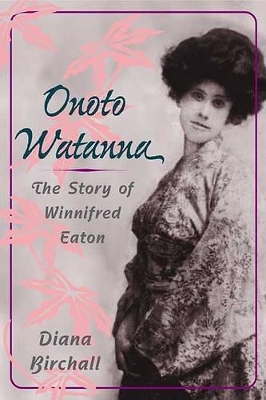The Asian American Experience
1 total work
In 1901, the young Winnifred Eaton arrived in New York City with literary ambitions, journalistic experience, and the manuscript for "A Japanese Nightingale", the novel that would sell many thousands of copies and make her famous. Hers is a real Horatio Alger story, with fascinating added dimensions of race and gender. While commercially successful women writers were uncommon a century ago, Winnifred Eaton (1875-1954) cultivated a particular persona to set herself apart even within this rare breed. Born to a British father and a Chinese mother, Winnifred decided to capitalize on her exotic appearance while protecting herself from Americans' scorn of Chinese: she "became" Japanese, assuming the pen name Onoto Watanna. While her eldest sister, Edith Maude Eaton (now acknowledged as the mother of Asian American fiction), was writing stories of downtrodden Chinese immigrants under the name Sui Sin Far, Winnifred's Japanese romance novels and stories became all the rage, thrusting her into the glittering world of New York literati.
Diana Birchall chronicles the sometimes desperate, sometimes canny, always bold life of her "bad grandmother," about whom she knew almost nothing until her own adulthood. Here are the details of an amazing professional career as a journalist, a bestselling novelist, and a Hollywood scriptwriting protge of Carl Laemmle at Universal Studios. Here, too, is the personal saga of a woman who bore "a book and a baby a year" during her troubled first marriage - and who, at the age of fifty-six, wooed back her estranged second husband when her Hollywood career hit the skids during the Great Depression. Having achieved early fame as a Japanese romance writer, Winnifred later jettisoned the kimono and wrote books (including one entitled Cattle) set on the plains of Alberta, where her husband owned a ranch. A chameleon? A desperate poseur? A shrewd businesswoman? She was all that, and much more, as Diana Birchall demonstrates. Navigating the shifting boundary between life and art, Birchall probes Winnifred's conflicting stories, personal tempests, and remarkable accomplishments, presenting a woman whose career was "sensational" in every sense.
Diana Birchall chronicles the sometimes desperate, sometimes canny, always bold life of her "bad grandmother," about whom she knew almost nothing until her own adulthood. Here are the details of an amazing professional career as a journalist, a bestselling novelist, and a Hollywood scriptwriting protge of Carl Laemmle at Universal Studios. Here, too, is the personal saga of a woman who bore "a book and a baby a year" during her troubled first marriage - and who, at the age of fifty-six, wooed back her estranged second husband when her Hollywood career hit the skids during the Great Depression. Having achieved early fame as a Japanese romance writer, Winnifred later jettisoned the kimono and wrote books (including one entitled Cattle) set on the plains of Alberta, where her husband owned a ranch. A chameleon? A desperate poseur? A shrewd businesswoman? She was all that, and much more, as Diana Birchall demonstrates. Navigating the shifting boundary between life and art, Birchall probes Winnifred's conflicting stories, personal tempests, and remarkable accomplishments, presenting a woman whose career was "sensational" in every sense.
